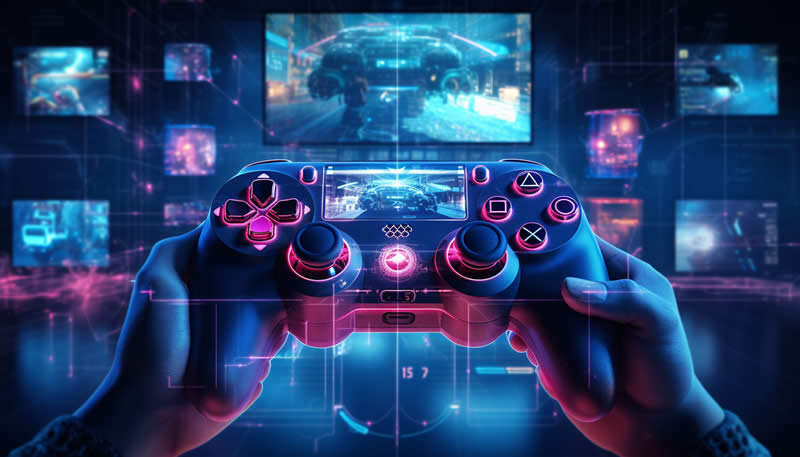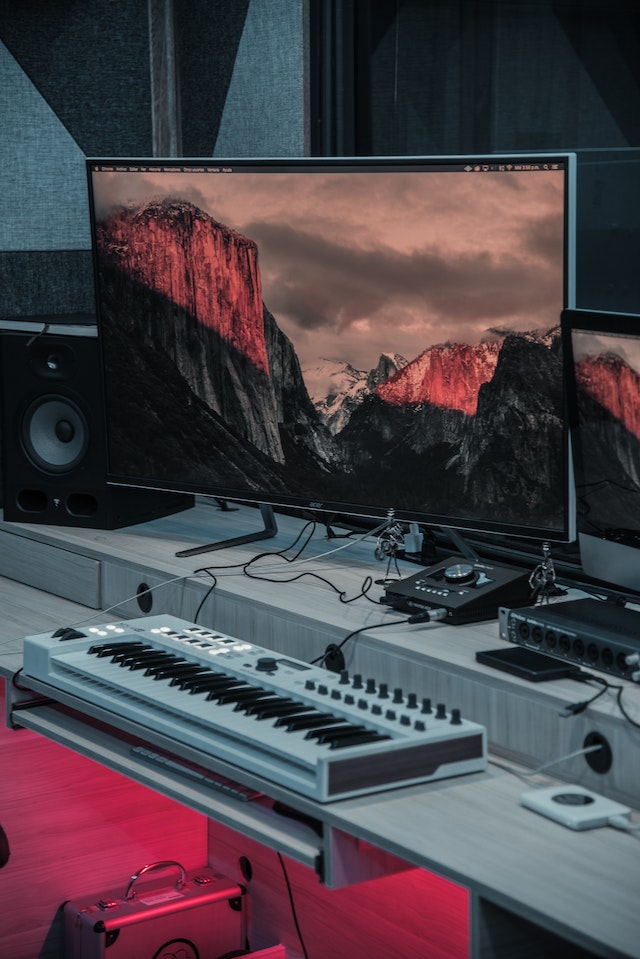The role of video game soundtracks: a new frontier for artists

Table of content
The role of video game soundtracks: a new frontier for artists - Introduction
From the moment the earliest video games blinked into existence, music has always had an essential role in the gaming universe.
The history of music in video games mirrors the evolution of the games themselves, transforming from humble origins into a world of unlimited potential. The beginning was modest; the music, if it could even be called that, was nothing more than simple bleeps and bloops.
These early sound effects were a far cry from what we consider to be a soundtrack today, but they laid the groundwork for what was to come.
The advent of better technology opened the doors to new possibilities, and game music evolved to become more than just aural ambiance. It started to act as a narrative instrument, creating immersive experiences that elevate gameplay to another level.
This evolution wasn't a simple linear progression, though. It was a journey that mirrored the technological advancements, trends, and artistic experimentation of the times.
Throughout this exploration, we will also consider the psychological impact of music on players, underscoring its importance not just as a complementary element to gameplay but as a driving force that shapes players' emotional engagement and responses.
In this exciting journey, we will find out that video game music, often overlooked, might be the secret ingredient that turns a good game into a memorable, emotional experience.
So, let us embark on this journey together, exploring how melodies and harmonies play a critical role in the gaming universe and discovering the opportunities that lie within for artists to innovate, captivate, and ultimately succeed.

KEY TAKEAWAYS
Music in video games is crucial for storytelling and enhancing emotional engagement. It provides auditory cues that guide players emotionally and significantly impacts their in-game responses.
The role of music in defining a game's identity is vital. Memorable themes associated with specific games or characters contribute to brand identity and enhance the player's immersive experience.
Iconic game soundtracks, such as those of Super Mario Bros and The Elder Scrolls series, have set a gold standard for game music, demonstrating its influence on player behavior and gaming experience.
Game soundtracks have a lasting cultural impact. They evoke strong nostalgia, promote player connectivity, and have inspired countless cover versions and remixes.
Advancements in technology have significantly impacted game music production, providing musicians with sophisticated tools to create complex soundtracks.
The growth of the gaming industry provides a platform for musicians to display their skills and expand their audience. Both established and emerging artists can benefit from collaborations with game developers, leading to increased recognition and popularity.
The importance of music in video games
One of the most profound roles of music in video games is its use as a storytelling device. Much like a film score, the soundtrack of a game enhances the narrative, providing auditory cues that help unfold the storyline, emphasize critical moments, or signal impending danger.
Music adds depth to a game's narrative, guiding players emotionally through the ebbs and flows of the gameplay. It's a form of non-verbal communication that speaks directly to our emotions, connecting us more deeply with the game's world and characters.

The psychological impact of music on players cannot be understated. It creates a whole spectrum of emotional responses – building tension, evoking excitement, or even inducing a sense of calm.
Music has the power to manipulate the emotional climate of a game, shaping the player's emotional response and influencing their actions.
An eerie, discordant track might signal a lurking threat, heightening a player's anxiety and alertness. A triumphant, uplifting theme during a hard-fought victory can enhance a player's sense of accomplishment and joy.

Music as a part of the game's identity
Another critical aspect of music in games is its role in defining the game's identity. Just as we associate iconic themes with popular films or TV shows, we associate specific melodies and music themes with characters or settings in games.
This musical association isn't just a passive backdrop; it becomes an integral part of the game's branding and identity. A memorable theme can immediately transport players back into the game's world, even when they're not actively playing.
For instance, think about how the familiar theme music of a certain Italian plumber, super Mario, instantly reminds us of the game, bringing back memories of jumping on Goombas and collecting coins.

This phenomenon, often overlooked, is actually a powerful tool for game developers to create an unforgettable gaming experience and establish a strong brand identity.
In essence, music in video games is more than just an accessory; it's a crucial element that enriches gameplay, triggers emotional responses, and carves a unique identity for the game.
Case studies: influential game soundtracks
Over the years, many game soundtracks have left indelible marks on the hearts of players.
Composed by artists who understood the intricate relationship between music, storytelling, and gameplay, these iconic scores set the gold standard for future game music compositions.
From Koji Kondo's memorable work in Super Mario Bros to the sweeping orchestral scores of The Elder Scrolls series by Jeremy Soule, these composers have left an indelible mark on the gaming industry.
These soundtracks played a significant role in the success of their respective games. A game's music can immerse players in the world, create emotional highs and lows, and even influence player behavior.
The haunting melody of “Silent Hill" emphasized the game's eerie atmosphere, making the horror more palpable. The adventurous tunes of “The Legend of Zelda" series enhanced the sense of exploration and discovery that is central to the game's experience.
These soundtracks did not just complement the gameplay – they defined it.
Player reactions and the lasting impact of these soundtracks on gaming culture
The influence of these soundtracks extends beyond the game's success, shaping player reactions and contributing to gaming culture.
Memorable game music has the power to evoke strong nostalgia, transport us back to specific moments in gameplay, and even form connections between players.
It's not uncommon to see people humming game tunes or using them as ringtones, further demonstrating the lasting impact of these soundtracks.
They have also inspired countless cover versions, remixes, and live performances, further embedding these melodies into our cultural fabric.
Understanding this can open new opportunities for musicians looking to venture into the realm of game music.

The impact of technology on game music production
In the early days, the tunes were simple, often composed with just a few electronic notes. Think of the catchy bleeps and bloops of retro arcade games.
But as technology advanced, so too did the tools used to create game music. New software and digital instruments have made it possible for artists to create complex, multi-layered soundtracks without needing a full orchestra or expensive recording equipment.
But technology has done more than just improve the tools of the trade. It has opened up a world of possibilities for game soundtracks.

Artists can now experiment with a variety of music styles, instruments, and sound effects. This has given rise to more diverse and unique game soundtracks, capable of capturing a wider range of emotions and enhancing different types of gameplay experiences.
If you're a musician looking for ways to have your music reach a wider audience, the world of gaming could be a promising avenue.
To help you as you learn more about this industry, here is a helpful guide on how to have your music noticed.
The use of procedural generation and dynamic music in games
Another exciting development brought about by technology is the use of procedural generation and dynamic music in games.
Unlike traditional game soundtracks that are pre-recorded and played at specific moments, procedural or dynamic music changes based on what's happening in the game.

For example, the music might become more intense during a boss fight or more serene while exploring a peaceful environment.
This kind of adaptive music makes the gaming experience more immersive and interactive, and it's an area that holds a lot of promise for innovative musicians.
The video game industry: a new frontier for musicians
Video games have undergone a tremendous evolution over the years, and so has their music. Today, they are not just about high-definition graphics or engaging gameplay, but also immersive soundtracks that bring the virtual world to life.
And as the gaming industry continues to grow, it has opened up a new frontier for music artists. Musicians now have a distinctive platform to display their skills and expand their fan base thanks to video games.

Whether it's a mesmerizing orchestral score or a pulsating electronic beat, game music now covers an incredible range of genres, creating a plethora of opportunities for artists.
Take, for example, the collaboration between Hans Zimmer and the "Call of Duty" franchise, or the Grammy-winning composer Christopher Tin's work for "Civilization IV."
These collaborations have resulted in some of the most iconic soundtracks in the gaming world, which have not only contributed to the games' success but have also elevated the artists' fame.
Opportunities for emerging artists in the gaming industry
And it's not just the well-established artists who are benefiting from this trend. The gaming industry also offers a wealth of opportunities for emerging artists.
It gives them a chance to unleash their fanbase, expose their music to a wider audience, and even experiment with new styles and genres. Plus, video games also offer unique branding opportunities for musicians.
When a piece of music becomes synonymous with a game, it helps cement the artist's brand in the minds of the players. This recognition can lead to increased music streams, concert attendance, and overall popularity.
The video game industry is no longer just for gamers; it's a vibrant, innovative, and promising platform for musicians of all genres.

The role of video game soundtracks: a new frontier for artists - Conclusion
Once seen as distinct mediums, music and video games have now set off on an amazing path.
As video games have evolved, so has their music, progressing from simple bleeps and bloops to soundtracks that rival those of blockbuster movies.
These immersive compositions do more than just provide a background score; they serve as narrators, psychologists, and artists, bringing characters and settings to life while striking a chord in the hearts of the players.
As technology advances, we are bound to witness an even greater synergy between music and video games. There is enormous potential for more interactive and dynamic music, opening a world of opportunities for artists to innovate and for gamers to experience music like never before.
On our blog at CalypsoRoom, we delve into a multitude of topics that touch every aspect of music, be it the importance of album artwork, how to promote your music, or even mental health and music.
As for CalypsoRoom, we invite you to be part of our community. Whether you're a musician looking for a new avenue to reach your audience, or a gamer seeking a deeper connection with the music you love, CalypsoRoom has something for everyone.
Explore our platform, connect with people from around the world, and let music be the bond that ties us all together. Welcome to the world of CalypsoRoom!
Music will save us all,
The CalypsoRoom Team
Frequently Asked Questions (FAQs)
Are video game soundtracks copyrighted?
Yes, video game soundtracks are usually copyrighted. The composers or the companies that produce the games own the rights.
How are video game soundtracks made?
Video game soundtracks are composed and produced by musicians using a variety of tools, including digital audio workstations, synthesizers, and traditional instruments. They often collaborate with game developers to ensure the music aligns with the game's theme, storyline, and overall atmosphere.
Is video game music a genre?
Video game music is not a genre in itself, but it covers a wide range of genres, from orchestral to electronic and more. It's characterized more by its function (enhancing gameplay and creating an immersive experience) than a specific style.
Famous video game soundtracks
Some famous video game soundtracks include "Super Mario Bros" by Koji Kondo, "The Elder Scrolls" series by Jeremy Soule, "Final Fantasy" series by Nobuo Uematsu, and "The Legend of Zelda" series also by Koji Kondo.
What are video game soundtracks?
Video game soundtracks are the music composed specifically to accompany gameplay. They often include background music, character themes, and music for specific scenes or settings.
How do video game soundtracks enhance the gaming experience?
Video game soundtracks help set the mood, reinforce the narrative, guide player emotions, and enhance immersion. They can influence player behavior and response, making the gaming experience more interactive and engaging.
How can I create my own video game soundtrack?
To create your own video game soundtrack, you would need to learn music composition and production, often using a digital audio workstation. It's also crucial to understand the game's narrative, mood, and style to create music that enhances the gaming experience.
How important are video game soundtracks to the overall game design?
Video game soundtracks are highly important to the overall game design. They contribute to a game's mood, theme, and narrative, and help create a more immersive and emotionally engaging player experience. A well-composed soundtrack can significantly contribute to a game's success and memorability.
back
Written by CalypsoRoom Editorial Team
The CalypsoRoom Editorial Team is a skilled and diverse group of writers, researchers, and industry specialists who have access to Calypso's data and information in order to give you broad knowledge about the music industry as well as helpful advice to help you manage your music and dancing career.
Updated June 2023
Company number: 681223
James's Walk 31, Dublin, Ireland
contact@calypsoroom.com
+353 (89) 435 8928



